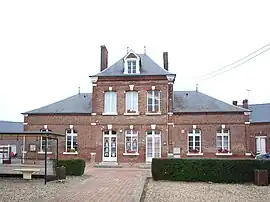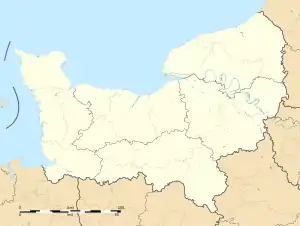Vieux-Rouen-sur-Bresle | |
|---|---|
 The town hall and school in Vieux-Rouen-sur-Bresle | |
Location of Vieux-Rouen-sur-Bresle | |
 Vieux-Rouen-sur-Bresle  Vieux-Rouen-sur-Bresle | |
| Coordinates: 49°50′05″N 1°43′16″E / 49.8347°N 1.7211°E | |
| Country | France |
| Region | Normandy |
| Department | Seine-Maritime |
| Arrondissement | Dieppe |
| Canton | Gournay-en-Bray |
| Intercommunality | CC Aumale - Blangy-sur-Bresle |
| Government | |
| • Mayor (2020–2026) | Bruno Borgoo[1] |
| Area 1 | 14.92 km2 (5.76 sq mi) |
| Population | 573 |
| • Density | 38/km2 (99/sq mi) |
| Time zone | UTC+01:00 (CET) |
| • Summer (DST) | UTC+02:00 (CEST) |
| INSEE/Postal code | 76739 /76390 |
| Elevation | 76–210 m (249–689 ft) (avg. 89 m or 292 ft) |
| 1 French Land Register data, which excludes lakes, ponds, glaciers > 1 km2 (0.386 sq mi or 247 acres) and river estuaries. | |
Vieux-Rouen-sur-Bresle (French pronunciation: [vjø ʁwɑ̃ syʁ bʁɛl], literally Old Rouen on Bresle) is a French commune in the Seine-Maritime department in the Normandy region in northern France.
Geography
A village of light industry and farming situated on the banks of the river Bresle in the Pays de Bray, some 27 miles (43 km) southeast of Dieppe at the junction of the D49, D96 and the D60.
Description
Vieux-Rouen-sur-Bresle is a Norman village in the Bresle valley located in Seine-Maritime and bordering the Somme department , which is part of the old Talou , and is marked by the presence of the glassware created in 1892.
It is crossed by the railway line from Épinay-Villetaneuse to Le Tréport-Mers, but the nearest station is the Aumale station. It is served by the RD 49, which connects Aumale to Tréport by the left bank of the Bresle.
The south and west of the town are wooded.
Hydrography
The river Bresle and its tributary Méline pass through Vieux-Rouen.
Population
| Year | Pop. | ±% p.a. |
|---|---|---|
| 1968 | 750 | — |
| 1975 | 768 | +0.34% |
| 1982 | 676 | −1.81% |
| 1990 | 713 | +0.67% |
| 1999 | 643 | −1.14% |
| 2007 | 673 | +0.57% |
| 2012 | 635 | −1.16% |
| 2017 | 564 | −2.34% |
| Source: INSEE[3] | ||
Places of interest
- The church of St. Jean-Baptiste, dating from the twelfth century.
- The church of Notre-Dame, dating from the twelfth century.
- The twelfth-century donjon of the castle of Mateputenam.
- The chateau, dating from the sixteenth century.
See also
References
- ↑ "Répertoire national des élus: les maires". data.gouv.fr, Plateforme ouverte des données publiques françaises (in French). 2 December 2020.
- ↑ "Populations légales 2021". The National Institute of Statistics and Economic Studies. 28 December 2023.
- ↑ Population en historique depuis 1968, INSEE